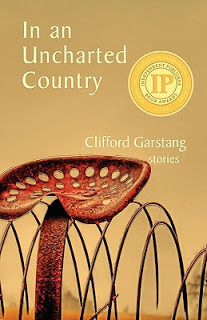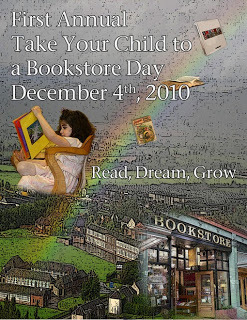Clifford Garstang's Blog, page 142
December 1, 2010
Books for Soldiers
 Books for Soldiers
Books for SoldiersHere's the deal. Visit Press 53 and buy a book for yourself or for someone else by December 10. Press 53 will then send a book to a soldier in your name. Very simple. And a very good thing.
You could, for example, buy my book, In an Uncharted Country. You'll get a very nice book that has won some awards and good reviews, and so will a soldier. But Press 53 has lots of other books to choose from, and all that I've read so far have been terrific. You can't go wrong.[image error]
Published on December 01, 2010 14:30
November 28, 2010
The New Yorker: "The Yellow" by Samantha Hunt
 Good news. You can read this story online, and, more good news, it's worth the read. It's fresh both in its plot and its language. And while the particular conflict that's explored in the story is resolved, the main character's problems certainly aren't—leaving the reader with plenty to ponder.
Good news. You can read this story online, and, more good news, it's worth the read. It's fresh both in its plot and its language. And while the particular conflict that's explored in the story is resolved, the main character's problems certainly aren't—leaving the reader with plenty to ponder.Roy's a mess. He's 42 and back living with his parents, although the author leaves it completely to the reader to imagine what's gone wrong with his life. A wrecked marriage? A sour career? Drugs? (Compare Jim Shepard's "Boys Town" which also features a disturbed son who is back at home, but in that story Shepard gives us a fair amount of the backstory.) While his parents are away, he moves the excess furniture out of his room and paints the walls bright yellow. (The color brings to mind "The Yellow Wallpaper" by Charlotte Perkins Gilman, the color on the walls may be as far as the parallel goes, except that both Roy and the protagonist from that story are a little nuts.) When his parents return Roy flees the house. Meanwhile, Suzanne has her own problems and is in danger of exploding under the pressure of her husband and kids who have mercifully left her alone.
But Roy runs over a dog in front of Suzanne's house and brings the body to the door. She confirms that the victim is her children's dog Curtains and as they both mourn the dog they . . . have sex on the floor. Um, sure, okay, why not? Except that Roy is awakened by the dog licking his shoulder! He's not dead after all! (Hmm. Earlier Roy concludes "the dog was dead for certain," "the neck was soft and floppy"; and he observes "there was blood on Roy's jacket. Blood on her arm, in her hair. Curtains's insides made pornographically public." So if the dog's not dead, and in fact seems to be fine, what's all that about?)And because they've had this bit of mournful sex, Suzanne decides the dog needs to be killed! Except Roy doesn't want to, and just at that moment her family returns, sending both Roy and the dog into the back yard.
So what happened? Is Roy dreaming? He's gone without sleep for a couple of days, apparently. The only thing he's eaten is an onion and Cheddar sandwich. And the walls in his room are bright yellow. Has he passed out and dreamed all this? Or is he dreaming the resurrection of the dog, sleeping on the floor of Suzanne's living room? Or did he only imagine all the details of the dog's death, and now it's actually alive?
Weird story. I like it.
November 29, 2010: "The Yellow" by Samantha Hunt[image error]
Published on November 28, 2010 16:25
Writing the Short Story: Make Your Story Great!
 A new section of my online course in writing the short story begins in January: Writing the Short Story: Make Your Story Great!. Sign up now to ensure your place in the class.
A new section of my online course in writing the short story begins in January: Writing the Short Story: Make Your Story Great!. Sign up now to ensure your place in the class.This is a combination lecture and workshop class that previous students have found very useful. (Check the student testimonials - scroll down.) Not only will we discuss the fundamentals of short story writing, we'll study examples from the masters and we'll conduct weekly writing exercises for practice. The workshop portion of the class allows all participants to receive class critiques of one twenty-page story AND a revision of that story.
I've also got sections of a more advanced story workshop and a unique course in how to publish short stories--both beginning early in the new year.
For more information about my classes and other writing courses, check out Writers.com.[image error]
Published on November 28, 2010 06:35
November 27, 2010
Holiday Shopping Suggestion: In an Uncharted Country
 Time for holiday shopping, and I've got a suggestion. My book! In an Uncharted Country is a collection of short stories that in some ways reads like a novel; the stories are all set in the same small town, themes resonate from story to story, and the characters overlap and reappear.
Time for holiday shopping, and I've got a suggestion. My book! In an Uncharted Country is a collection of short stories that in some ways reads like a novel; the stories are all set in the same small town, themes resonate from story to story, and the characters overlap and reappear.It's a pretty good book, if I say so myself. Some terrific writers like Tim O'Brien, Elizabeth Strout, and Peter Ho Davies had some very nice things to say about the book, and you can read their comments: here.
The book also picked up some very nice reviews, which you can read here, here, and here.
Two of the stories actually take place at Christmas, so it's a wonderful read for this time of year.
You can get a signed copy from my website or from most of the independent bookstores in and around Staunton, VA. Or you can ask your local bookstore to order it. You can also get it through Indiebound or directly from the publisher, Press 53. And if you're a Kindle owner, or want to give a gift to someone who is, you can buy the Kindle Edition.[image error]
Published on November 27, 2010 06:14
November 25, 2010
100 Notable Books of 2010 - Holiday Gift Guide - NYTimes.com
100 Notable Books of 2010 - Holiday Gift Guide - NYTimes.com
It's always exciting when these year-end lists appear. It's especially interesting today as I try to organize the piles of books on the floor and find places for them on the shelves. This is impossible, as there isn't enough room, but perhaps I'll find books that can be removed. Hah. Also, I'm terribly embarrassed by the number of books I own that I haven't read, especially those by friends. To everyone: I'm sorry!
But to the list.
Of the fiction titles, I own about 13. And haven't read even one. On the fiction side I own two that I haven't read. What the hell have I been doing?[image error]
It's always exciting when these year-end lists appear. It's especially interesting today as I try to organize the piles of books on the floor and find places for them on the shelves. This is impossible, as there isn't enough room, but perhaps I'll find books that can be removed. Hah. Also, I'm terribly embarrassed by the number of books I own that I haven't read, especially those by friends. To everyone: I'm sorry!
But to the list.
Of the fiction titles, I own about 13. And haven't read even one. On the fiction side I own two that I haven't read. What the hell have I been doing?[image error]
Published on November 25, 2010 08:42
November 24, 2010
2010 New Yorker Story of the Year--Nominations are Open
As the year winds down, it's time to think about the best short stories from The New Yorker. Last year, as you may recall, we declared two great stories co-winners of the 2009 Story of the Year honors: Chris Adrian's "A Tiny Feast" and George Saunders's "Victory Lap."
To nominate, send me an email or leave a comment here mentioning your favorites. I'll take those nominations into consideration in formulating a list of the Top Ten New Yorker Stories of 2010, and then in late December I'll post a poll for voting. I'll announce the winner on January 1, 2011.
All of this year's stories (and a considerable number of novel excerpts) have been discussed to some degree on this blog. To refresh your recollection, brows through the posts: 2010 New Yorker Fiction.
I'm very curious to know what your favorites are!
To nominate, send me an email or leave a comment here mentioning your favorites. I'll take those nominations into consideration in formulating a list of the Top Ten New Yorker Stories of 2010, and then in late December I'll post a poll for voting. I'll announce the winner on January 1, 2011.
All of this year's stories (and a considerable number of novel excerpts) have been discussed to some degree on this blog. To refresh your recollection, brows through the posts: 2010 New Yorker Fiction.
I'm very curious to know what your favorites are!
Published on November 24, 2010 16:27
The New Yorker: "Assimilation" by E.L. Doctorow
Another story NOT available to non-subscribers (but next week's is, so take heart!).
Ramon is a smart guy. His brother, at the beginning of the story, is in prison. Even in prison, though, he has access to information, and at the end of the story he looks like he has access to the kind of protection Ramon is going to need. Because our hero has pissed off the Russian (or some other unspecified East European) mob and things are going to get ugly.
Ramon, looking for money for graduate school but trying to avoid his brother's world, takes a job as a dishwasher in Borislov's restaurant. He's promoted to bus boy—he's being set up—and then to waiter, if he will agree to a green-card marriage. He heads to Russia (or wherever), marries Jelena, and then works with her at the restaurant. He decides he's in love with Jelena, although she has a boyfriend at home and treats Ramon badly. Borislov and his mob friends put pressure on Ramon to make sure that Jelena will get her papers. Jelena, softening toward Ramon, tells him he should beat her, that she deserves it, but Ramon's brother clues him in: if he beats her, or if they can make it look as though he beats her, they can cut him out of the picture that much earlier because the court will grant a divorce and Jelena will be free.
At this point, the reader—this reader, anyway—suspects that Jelena is in cahoots with the mobsters. Instead, though [spoiler alert], she agrees to run away with Ramon, and they head straight to Ramon's brother, the only one with the firepower to protect them.
Uh oh. But that's the end of the story. It's going to get nasty, probably, but we're not going to get to see it. Unless this is a novel excerpt. But I don't even want to think that.
So it's a readable story with a somewhat sentimental, unexpected ending that leaves a major question unanswered. It's okay. Not my favorite, but okay. What's okay about it is that Ramon is forced, for the sake of the girl, to enter his brother's world, and it's obviously a tough choice for him. It may still end badly for him, but it's the kind of difficult decision that is interesting to see in fiction. I also like the multiple meanings of the title. What's not so great, though, is that Ramon's feelings for the girl are kind of a cliché. Sure, go through with the fraud, even feel sorry for her because she's in a tough spot herself, but fall in love? I'm not buying that.
Also worth checking out for more insights into this story is Deborah Treisman's chat with Doctorow: This Week in Fiction.
November 22, 2010: "Assimilation" by E.L. Doctorow
Ramon is a smart guy. His brother, at the beginning of the story, is in prison. Even in prison, though, he has access to information, and at the end of the story he looks like he has access to the kind of protection Ramon is going to need. Because our hero has pissed off the Russian (or some other unspecified East European) mob and things are going to get ugly.
Ramon, looking for money for graduate school but trying to avoid his brother's world, takes a job as a dishwasher in Borislov's restaurant. He's promoted to bus boy—he's being set up—and then to waiter, if he will agree to a green-card marriage. He heads to Russia (or wherever), marries Jelena, and then works with her at the restaurant. He decides he's in love with Jelena, although she has a boyfriend at home and treats Ramon badly. Borislov and his mob friends put pressure on Ramon to make sure that Jelena will get her papers. Jelena, softening toward Ramon, tells him he should beat her, that she deserves it, but Ramon's brother clues him in: if he beats her, or if they can make it look as though he beats her, they can cut him out of the picture that much earlier because the court will grant a divorce and Jelena will be free.
At this point, the reader—this reader, anyway—suspects that Jelena is in cahoots with the mobsters. Instead, though [spoiler alert], she agrees to run away with Ramon, and they head straight to Ramon's brother, the only one with the firepower to protect them.
Uh oh. But that's the end of the story. It's going to get nasty, probably, but we're not going to get to see it. Unless this is a novel excerpt. But I don't even want to think that.
So it's a readable story with a somewhat sentimental, unexpected ending that leaves a major question unanswered. It's okay. Not my favorite, but okay. What's okay about it is that Ramon is forced, for the sake of the girl, to enter his brother's world, and it's obviously a tough choice for him. It may still end badly for him, but it's the kind of difficult decision that is interesting to see in fiction. I also like the multiple meanings of the title. What's not so great, though, is that Ramon's feelings for the girl are kind of a cliché. Sure, go through with the fraud, even feel sorry for her because she's in a tough spot herself, but fall in love? I'm not buying that.
Also worth checking out for more insights into this story is Deborah Treisman's chat with Doctorow: This Week in Fiction.
November 22, 2010: "Assimilation" by E.L. Doctorow
Published on November 24, 2010 16:15
November 23, 2010
Q10
In early October I wrote about 750Words.com, a site that pushed a subscriber to write at least 750 words a day. The problem, as I eventually discovered, is that your work is being saved onto their site. While one can always export, there's a risk in the meantime that work will be lost, which is what happened to me one day when the site's server was down or malfunctioning and my output wasn't saved. Goodbye 750Words. It didn't work out for me, but I know others who love it, and I say good for them. If it helps with discipline, it's a good thing.
But today I saw a note on Galleycat about Q10, a program that attempts to help you block out distractions by blacking out your computer screen so that you're just typing words, not word-processing. It even has sound effects--like a typewriter. It has a built-in timer and other settings that one can use to help keep one's mind on the work, and I'm looking forward to using it when I begin working on something new. (I don't think it's so great for editing a long manuscript that's already in MS Word.) But take a look and give it a try . . .
But today I saw a note on Galleycat about Q10, a program that attempts to help you block out distractions by blacking out your computer screen so that you're just typing words, not word-processing. It even has sound effects--like a typewriter. It has a built-in timer and other settings that one can use to help keep one's mind on the work, and I'm looking forward to using it when I begin working on something new. (I don't think it's so great for editing a long manuscript that's already in MS Word.) But take a look and give it a try . . .
Published on November 23, 2010 16:00
November 22, 2010
"15 Top Online Journals Speak" -- Huffington Post
Over the past several months, Anis Shivani has been speaking his mind in his Huffington Post column on literary matters--the best books, the most over-rated books, etc. Usually a negative wave of comments follows these columns, as if the guy isn't entitled to his opinions. Now we have an interesting and timely (for me) column about online journals, in which Shivani has editors of 15 magazines talk about the industry. Nothing wrong with that, but of course editors of other journals who weren't asked to speak are doing some sniping.
Whatever. It's an interesting compilation and you can read it: here.
Here's Shivani's lead-in:
Anis didn't ask me, but I thought I'd offer my answers here, speaking as editor of Prime Number Magazine.
One thing online journals are doing is reaching readers. I don't know exactly how many people have read Prime Number in the 4 months we've been around, but I know it's a lot. You don't have to buy a subscription. You don't have to buy it on the newsstand. You don't have to store it on a shelf until you get around to reading it. You read it. It's archived. You come back and read it again. Furthermore, we do updates. We're quarterly, but between issues we have 4 mini issues with flash and poetry. Print can't do that--except that many print magazines ARE doing it through their online presences.
Come of age? I have no idea. I think that's out of our control. I know that we're attracting a lot of submissions from good writers, and I'm pleased with the work we've published. When the prize anthologies take the work that appears online seriously, then maybe we can say for sure that online magazines have come of age.
Multi-media. We haven't done this yet, but simply the ability to post audio, video, and images makes online magazines a jump ahead of print magazines which, at best, include a few color prints--at great expense. I also like the fact that we can include hyper links--especially for our contributors with books out where I can link to the Indiebound page for the book, or to the contributor's website or blog.
Whatever. It's an interesting compilation and you can read it: here.
Here's Shivani's lead-in:
After at least a decade of sustained presence, what can we say about the status of journals that promote literature online? We asked editors of some of the oldest online journals, as well as some new ones, these questions: What are online literary journals doing that print journals are failing to do? Have online journals come of age yet? Can you point to specific examples of areas where online literary journals are in a league of their own?Excellent questions, and we get some good answers from people like Rebecca Frank (Memorious), Greg Donovan (Blackbird), Thom Didato (failbetter.com), Steve Seighman (Monkeybicycle), Kim Chinquee (formerly with elimae), and several editors and magazines I don't know as well.
Anis didn't ask me, but I thought I'd offer my answers here, speaking as editor of Prime Number Magazine.
One thing online journals are doing is reaching readers. I don't know exactly how many people have read Prime Number in the 4 months we've been around, but I know it's a lot. You don't have to buy a subscription. You don't have to buy it on the newsstand. You don't have to store it on a shelf until you get around to reading it. You read it. It's archived. You come back and read it again. Furthermore, we do updates. We're quarterly, but between issues we have 4 mini issues with flash and poetry. Print can't do that--except that many print magazines ARE doing it through their online presences.
Come of age? I have no idea. I think that's out of our control. I know that we're attracting a lot of submissions from good writers, and I'm pleased with the work we've published. When the prize anthologies take the work that appears online seriously, then maybe we can say for sure that online magazines have come of age.
Multi-media. We haven't done this yet, but simply the ability to post audio, video, and images makes online magazines a jump ahead of print magazines which, at best, include a few color prints--at great expense. I also like the fact that we can include hyper links--especially for our contributors with books out where I can link to the Indiebound page for the book, or to the contributor's website or blog.
Published on November 22, 2010 18:49
November 20, 2010
Take your child to a bookstore
 December 4 is Take your child to a bookstore day. Actually, every day should be Take your child to a bookstore day, but December 4 is a good day to start.
December 4 is Take your child to a bookstore day. Actually, every day should be Take your child to a bookstore day, but December 4 is a good day to start.
Published on November 20, 2010 04:31



